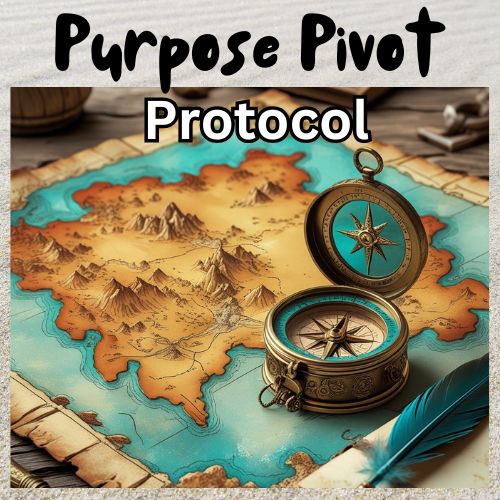How to Leave Behind What You’ve Built Without Losing Who You Are
What this is: A compassionate exploration of the terror, grief, and unexpected liberation that comes when successful people consider stepping away from their empires, careers, or identities they’ve spent decades building.
What this isn’t: Career advice, retirement planning, or a cheerful “just follow your passion” pep talk that ignores the very real psychological complexity of releasing a life’s work.
Read this if: You’ve built something impressive but feel trapped by it. You wake at 3 a.m. wondering if this is all there is. You’re terrified that without your title, company, or professional identity, you’ll simply… disappear.
Five Key Takeaways for the Fatally Accomplished
- Your identity crisis is actually an identity opportunity. That uncomfortable feeling isn’t failure, it’s your authentic self knocking rather insistently on the door you’ve kept locked for years.
- Walking away doesn’t erase what you’ve built, it completes it. The greatest leaders know when their chapter ends and someone else’s begins.
- You are not your résumé, and thank goodness for that. Your achievements are things you’ve done, not who you are, though you’ve been confusing the two for so long they’ve become entangled.
- The void you fear is actually spaciousness. What feels like losing yourself is often the first time you’ve had room to find yourself.
- Your next chapter doesn’t diminish your last one. Evolution isn’t betrayal. Growth isn’t abandonment. And reinvention isn’t admission of failure.
Introduction: The Cage You Built Yourself
There’s a particular flavour of success that tastes like achievement but feels like entrapment. You’ve built something remarkable, something that bears your name or carries your vision or wouldn’t exist without your relentless determination. And now? Now you’re not entirely sure whether you own it or it owns you.
The thought of walking away creates a vertigo so profound you can barely let yourself think it. Who would you be without this company, this practice, this role you’ve inhabited so completely that colleagues, clients, even your own family, can’t seem to imagine you outside of it? More terrifyingly, can you imagine yourself outside of it?
This isn’t about burnout, though I’m sure you’re familiar with that particular companion. This is something deeper, more existential. This is about the dawning realisation that the life you worked so hard to build might not be the life you want to live anymore. And the guilt, oh, the guilt of even thinking such a thing.
But here’s what I’ve learned from twenty years as a doctor specialising in stress management, fifteen years hosting retreats where exhausted professionals walk the Camino de Santiago, and countless conversations with people who’ve stood exactly where you’re standing now: this crisis of identity isn’t the end of your story. It’s the beginning of the most authentic chapter you’ve ever written.
The Woman Who Built an Empire and Then Dismantled It
Sarah Elisabeth Thornton sat in her corner office on the forty-second floor, watching the November rain streak the windows, transforming the cityscape below into an impressionist painting of blurred lights and shadows. The leather of her chair creaked as she shifted, a sound so familiar it had become the soundtrack to a thousand difficult decisions. But this decision, the one she’d been avoiding for eighteen months, was different.
The company she’d founded twenty-three years ago, the one that had grown from a single rented desk to three continents and 847 employees, the one that bore her name in elegant serif font on buildings in seven cities, no longer fit. The realisation had crept in slowly, like cold water seeping through a crack, until one morning she woke and knew with absolute clarity: she was done.
Not burned out. Done. There’s a difference.
Her hands trembled as she touched the edge of her mahogany desk, feeling the smooth wood grain beneath her fingertips. How many times had she gripped this desk during crisis calls? How many strategies had been sketched on the notepad that sat, as always, perfectly aligned in the upper right corner? The smell of her office, that particular combination of expensive carpet, her bergamot hand cream, and the faint coffee aroma that never quite disappeared, seemed suddenly overwhelming. This was the scent of her identity, or what she’d thought was her identity.
The terror came in waves. Without Thornton Consulting, who was Sarah Elisabeth Thornton? The woman who turned around failing corporations? The sought-after keynote speaker? The name that opened doors and commanded respect before she even entered the room? Or simply… someone’s mother, someone’s ex-wife, someone who used to be someone?
She could taste the copper tang of fear in her mouth as she imagined telling her board. Worse, telling her father, who’d never built anything but had endless opinions about those who did. The sound of her own heartbeat seemed deafening in the quiet office. Through the window, she watched a bird, just a small dark shape against the grey sky, flying in whatever direction it chose. The freedom of it made her throat tighten.
That evening, she drove to the place she always went when the walls closed in: a small café three miles from her home, the kind of place where nobody knew her name or cared about her LinkedIn profile. The warmth inside hit her face as she entered, steam from the espresso machine creating small clouds, the comfortable murmur of conversations she wasn’t part of, the clink of spoons against ceramic. She ordered chamomile tea, something she never drank, and sat by the window.
An elderly man at the next table was showing his grandson photographs, their heads bent together over a phone, both laughing. The boy couldn’t have been more than eight. “Tell me about when you were young, Grandpa,” she heard him say. The man’s response was immediate, animated, joyful: “Oh, I wasn’t always this handsome, you know…”
Sarah found herself crying, right there in the café, tears running down her cheeks and dropping onto the scratched wooden table. Not from sadness, exactly, but from a sudden, piercing recognition. That man wasn’t telling his grandson about his career. He was sharing who he’d been, who he was. His identity wasn’t trapped in what he’d built. It lived in him.
She pulled out her phone, hands still shaking but steadier now, and texted her executive coach: “We need to talk about succession planning. Real succession planning. I’m ready.”
The relief that flooded through her body was so intense she had to steady herself against the table. Her chest loosened. The café air tasted sweeter somehow. She could hear the music playing, something gentle and acoustic that she’d been too preoccupied to notice before. The possibility of a future that wasn’t just more of the same opened before her like a door she’d been too afraid to try.
She didn’t know yet what came next. She only knew that the cage she’d built, beautiful and impressive as it was, had a door. And she’d just decided to find the key.
Why Identity and Achievement Become Dangerously Entangled
What Happens When Success Becomes Your Surname?
For driven professionals, entrepreneurs, and executives, success rarely arrives quietly. It demands everything: your time, your energy, your weekends, your attention at your daughter’s school play, your presence at dinner parties where you’re physically there but mentally reviewing tomorrow’s presentation. Slowly, imperceptibly, your professional identity doesn’t just describe what you do, it becomes who you are.
This entanglement happens through repetition and reinforcement. Every introduction begins with your title. Every conversation eventually winds its way to your work. Your achievements become conversational currency. Your business card might as well say “Doctor/CEO/Founder/Director” and then, in smaller print, “Also Sometimes a Person.”
I’ve witnessed this phenomenon countless times during my twenty years in medical practice and fifteen years hosting Inner Camino crisis management retreats in southwest France. The peoplewho arrive at my Camino de Santiago walking retreats often can’t complete the simple exercise: “Describe yourself without mentioning your profession.” They stumble, genuinely confused, as if I’d asked them to describe the colour blue without using colours.
This isn’t vanity or superficiality. It’s the natural consequence of pouring yourself so completely into something that the boundaries between you and it dissolve. You’ve metabolised your work into your very sense of self. Your achievements have become your autobiography.
But here’s what I’ve learned as an NLP master practitioner and medical hypnotherapist working with people in transition: this entanglement, whilst feeling permanent, is actually a trance state. You’ve been hypnotised by your own success story, repeating it so many times that you’ve forgotten it’s just one story you could tell about yourself.
The Crisis That Precedes The Transformation
Walking away triggers what I call the “identity dissolution panic,” a psychological state where your sense of self feels genuinely threatened. This isn’t dramatic language, it’s neuroscience. The brain structures that have been reinforcing your professional identity for decades don’t distinguish between career transition and actual threat. Your amygdala responds to the thought of resignation with the same alarm system it would activate if you were standing at the edge of a cliff.
This is why successful people stay in roles they’ve outgrown. It’s not lack of courage or imagination. It’s that the brain perceives starting over as existential danger.
Yet in my eight non-fiction books about divorce, loss, unexpected illness, and coping with crises, the pattern remains consistent: the people who break through this fear don’t do so by becoming fearless. They do it by recognising that who they are exists independently of what they’ve built. The company can thrive without you. The practice can continue. Your professional legacy stands complete. But you? You have chapters left to write that have nothing to do with quarterly earnings or strategic initiatives.
How Your Transition Transforms More Than Just You
The Ripple Effect of a Courageous Reinvention
When you summon the courage to walk away from what you’ve built, you don’t just change your own story. You give permission to everyone watching, especially those who thought they had no choice but to keep performing in roles that have become costumes rather than callings.
Your employees, your colleagues, your children, they’re all absorbing the lesson you’re teaching. If you stay trapped, you teach them that success is a life sentence. If you transition with integrity, you teach them that wholeness matters more than titles, that evolution is strength, not weakness.
I’ve seen this ripple effect firsthand in my Purpose Pivot Protocol online course. When one leader steps into authentic transition, it creates space for others to examine their own lives honestly. Your courage becomes contagious. Your reinvention gives others permission to reimagine their own futures.

The Purpose Pivot Protocol – drawing inspiration from the Camino de Santiago, this transformative course guides you through a proven framework to recalibrate your authentic purpose and create a meaningful and fulfilling next act. Get immediate access
Beyond your immediate circle, your community benefits when successful people demonstrate that there’s life, meaning, and purpose beyond professional achievement. You become a model for sustainable success, for knowing when to hold on and when to let go, for understanding that the greatest legacy isn’t what you built but how you lived.
Gratitude Practice: Finding Yourself in What You’re Leaving Behind
Each evening for the next week, write down three things:
- Something your professional identity taught you about yourself. (Not what you achieved, but what you discovered about your character, your values, your capabilities.)
- Something that will remain true about you regardless of your title. (Your kindness, your curiosity, your sense of humour, your ability to see solutions.)
- Something you’re grateful for that has nothing to do with your professional success. (A friendship, a sunset, your ability to make perfect scrambled eggs, the way your dog greets you.)
This practice gently separates identity from achievement, reminding you that you existed before your success and you’ll continue existing after you walk away. You’re not losing yourself. You’re finally meeting yourself.
Further Reading: Books That Understand Your Transition
1. “Transitions: Making Sense of Life’s Changes” by William Bridges
I recommend this book first because Bridges understands what most career advice misses: the neutral zone. That uncomfortable space between letting go and beginning again where you feel lost and directionless. He doesn’t rush you through it. He helps you inhabit it wisely. For high-achievers who are used to having a plan, learning to trust the in-between is revolutionary.
2. “The Second Mountain” by David Brooks
Brooks writes with unusual honesty about how first-half-of-life success (building, achieving, climbing) eventually rings hollow. His exploration of second-mountain living, where contribution and connection matter more than conquest, speaks directly to executives wondering if there’s more to life than the summit they’ve already reached. It’s permission, in book form, to want something different.
3. “Falling Upward: A Spirituality for the Two Halves of Life” by Richard Rohr
Rohr, a Franciscan priest, offers a spiritual framework for understanding why successful people often face their deepest questions at the height of their achievement. His concept of the “second half of life” as necessarily different from the first gives language to the transition you’re experiencing. This isn’t failure, it’s maturation. Not everyone will resonate with his religious framework, but his wisdom transcends denomination.
4. “Die Empty: Unleash Your Best Work Every Day” by Todd Henry
Henry’s premise is deceptively simple: don’t die with your best work still inside you. For people considering walking away, this book asks the uncomfortable question: are you staying because you still have contribution to make here, or because you’re avoiding the harder work of discovering what else you might create? It’s a book about legacy that might help you see yours isn’t finished, it’s just changing form.
5. “The Crossroads of Should and Must: Find and Follow Your Passion” by Elle Luna
Luna’s slim, beautifully illustrated book distinguishes between “should” (what others expect) and “must” (what your soul demands). For professionals who’ve spent careers meeting everyone else’s expectations whilst ignoring their own inner compass, this book is a gentle but firm invitation to finally listen to that quieter voice that’s been waiting for your attention.
P.S. My own book, “Embracing Change, in 10 Minutes a Day,” offers daily practices specifically designed for people navigating major life transitions. It’s structured for busy professionals who need bite-sized wisdom they can actually implement between meetings, including exercises I’ve developed over fifteen years of retreat work and my training as a life transition coach. Available on my website and wherever books are sold.
Voices
“I arrived at Dr. Montagu’s Camino retreat convinced I was having a breakdown because I wanted to leave the law firm I’d built. The walking, the space, the storytelling circles, they showed me I wasn’t losing my mind, I was finding it. Sitting with her Friesian horses, who couldn’t care less about my impressive client list, I finally understood: I am not my career. The relief was physical. Within six months of returning, I’d begun my transition. Best decision I’ve ever made, including starting the firm in the first place.”
— Rebecca M., Corporate Attorney, London
“The Inner Camino virtual storytelling circles gave me something I didn’t know I needed: witnesses to my transition who weren’t invested in my old identity. When I shared my fear about stepping down as CEO, nobody tried to talk me out of it or convince me to stay. They just listened, really listened, and helped me see my own courage. That circle held me through the scariest months of my life. Now, eighteen months into my new chapter, I’m still part of the group. We’ve all transformed, together.”
— Jennifer S., Former CEO, Virtual Circle Member
Five Razor-Sharp FAQs: What People Are Actually Asking
How do I know if it’s time to walk away or if I’m just tired?
Tiredness wants rest. A soul that’s finished wants release. Here’s the test: imagine taking a three-month sabbatical where you’re completely refreshed. Now imagine returning to your current role. Does the thought energise you or make your chest tighten? Fatigue is temporary. Completion is existential. If rest sounds good but return sounds like re-imprisonment, you have your answer.
What if I walk away and regret it?
This question assumes walking away is irreversible, but most transitions are negotiations, not exits. You might step back and discover consultancy work that keeps your hand in without consuming your life. You might find you miss certain aspects and can incorporate them differently. The bigger question: what if you stay and regret never trying? That regret has no remedy. At least transition regret can be course-corrected.
How do I financially prepare for stepping away from my primary income?
This deserves more than a paragraph, but here’s the starting point: begin modeling your exit twelve to eighteen months before you take it. Work with a financial planner who understands entrepreneurial transition. Build your “freedom fund” that covers twelve months of expenses. Explore how your expertise translates to less time-intensive income streams. Most importantly, separate your identity from your income. You might earn less. You’ll live more. That’s a trade-off worth considering.
Won’t people judge me for walking away from success?
Yes. Some will. People who’ve never built anything substantial will have opinions about why you shouldn’t dismantle what you’ve built. People who are trapped in their own successful cages will judge you for finding your key. Here’s the liberating truth: their judgment is about their fear, not your choice. The people whose opinions actually matter, the ones who love you rather than your achievements, they’ll understand. As for the rest? Their judgment is the price of your freedom. Pay it gladly.
How do I introduce myself once my title is gone?
This is the existential heart of your fear, isn’t it? I’ll tell you what I’ve watched successful people discover: you introduce yourself as a person with interests, values, and curiosity rather than as a profession with a title. Try it at a dinner party. Instead of “I’m the CEO of…” say “I’m fascinated by…” or “I’ve been exploring…” or simply “I’m Sarah.” The conversations that follow are often the first authentic ones you’ve had in years. Your identity isn’t what you do. It’s how you engage with being alive.
Conclusion: The Identity That Survives Everything
Walking away from what you’ve built doesn’t diminish it. It doesn’t erase your accomplishments or make your professional life meaningless. It completes that chapter so a new one can begin. Your achievements stand as testimony to what you’re capable of. Your transition stands as testimony to who you are.
The person you are without your title, without your company, without your professional identity, that person has been there all along. They’ve been the one making the decisions, showing the courage, demonstrating the resilience. They’ve been you, underneath the achievements, before the success, beyond the accolades.
You are not what you’ve built. You’re the one who built it. And you can build again. Or rest. Or explore. Or simply exist without building anything at all. That choice, that freedom, that spaciousness, it’s not loss. It’s reclamation.
As the poet David Whyte writes: “The antidote to exhaustion is not necessarily rest. The antidote to exhaustion is wholeheartedness.”
Perhaps it’s time to discover what wholeheartedness looks like when you’re no longer performing someone else’s definition of success, or even your own outdated one.
A Bold Invitation
If you’re standing at this crossroads, exhausted by achievement and terrified of what comes next, I want to extend a very specific invitation.
My Camino de Santiago CrossRoads walking retreats in southwest France are designed precisely for people like you. Not tourists seeking picturesque walks, though the landscape is breathtaking. Not casual wanderers looking for a holiday, though rest is woven throughout.
These retreats are for successful, stressed, questioning professionals who need space to hear themselves think. Who need physical distance from their impressive lives to gain psychological distance from their consuming identities. Who need to walk, literally and metaphorically, into a different way of being.
You’ll walk moderate distances through stunning French countryside, allowing your body to release what your mind has been holding. We practice mindfulness and meditation techniques I’ve refined over twenty years of stress management work as a GP, techniques that actually work for people whose minds run at executive speed. We gather in storytelling circles, sometimes with just us, sometimes in the presence of my Friesian horses, who have an uncanny ability to help humans drop pretence and find authenticity.
But here’s what really happens on these retreats: you discover you’re still you without your title. You remember what it feels like to be interested in things that don’t advance your career. You have conversations where nobody asks what you do, only who you are. You sleep properly for the first time in years. You cry, you laugh, you question everything, and somewhere along the path, you find the courage to imagine your next chapter.
The Inner Camino isn’t about religious pilgrimage, though some find spiritual renewal. It’s about the internal journey that happens when you give yourself permission to step off the treadmill long enough to ask: is this the life I want? And if not, what am I going to do about it?
Space is intentionally limited to ensure the intimacy necessary for transformation. If this speaks to you, I invite you to explore the retreat details and consider whether now might be your time to take the walk that changes everything.









Stress destroys Lives. To find out what you can do to safeguard your sanity by taking my insight-giving quiz, subscribe to my mailing list.

“I am an experienced medical doctor – MBChB, MRCGP, NLP master pract cert, Transformational Life Coach (dip.) Life Story Coach (cert.) Stress Counselling (cert.) Med Hypnotherapy (dip.) and EAGALA (cert.) I may have an impressive number of letters after my name, and more than three decades of professional experience, but what qualifies me to excel at what I do is my intuitive understanding of my clients’ difficulties and my extensive personal experience of managing major life changes using strategies I developed over many years.” Dr M Montagu

